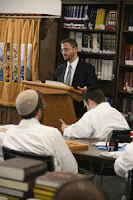Happenings at the Yeshiva
 Starting a few years ago, we began to schedule Eitzah in intensive 2-3 day blocks, as this has proven highly beneficial to the learning and training experience. Students found this last session to be a real growth experience - intense and demanding and extremely helpful in understanding the workings of institutions, and their roles as future players and leaders in such institutions. We are grateful to Eitzah for the wonderful training that they provide our students as they are on the cusp of receiving semikha and going out into the larger world.
Starting a few years ago, we began to schedule Eitzah in intensive 2-3 day blocks, as this has proven highly beneficial to the learning and training experience. Students found this last session to be a real growth experience - intense and demanding and extremely helpful in understanding the workings of institutions, and their roles as future players and leaders in such institutions. We are grateful to Eitzah for the wonderful training that they provide our students as they are on the cusp of receiving semikha and going out into the larger world.Our Seminar on Learning and Developmental Disabilities is the second part of the Program on Disabilities sponsored by Reuven and Shelley Cohen in memory of their son Nathaniel, alav ha'shalom. The first half of this program was held two years ago when we focused on people with physical disabilities. The program this year was a phenomenal one, and of course very close to my heart, as both my sons have learning disabilities and Asperger's-related disorders.
This is an issue that touches not only me personally, but, it would seem, almost all of us. We began the week by going around the room and having each student say a few words about if they had ever had any direct experience with people with learning or developmental disabilities. Of the students present, 90% of them had either family members or friends that had such disabilities, ranging from minor Asperger's to severe autism. For a phenomenon that is so widespread in the general population - and perhaps more so among the Jewish population - we truly need to be doing more to help these children and their families, and to work to create a true ethos of inclusion.
The week continued with classes in halakha - on chinukh challenges and on placing children with severe developmental disabilities in non-kosher living facilities. On Wednesday afternoon, we heard from a panel of parents and siblings of children with developmental disabilities. One of them, Ms. Jodi Samuels, has started a facebook page, Caily's World , to connect families of children with disabilities.
On Thursday, the entire yeshiva came together for a full day on the topic. We began the day addressing the challenge of inclusion in synagogues. Rabbi Dan Grossman, from Adath Israel in Lawrenceville, NJ, began the day. Rabbi Grossman described how he had created a truly inclusive shul in NJ, with no budget to begin with, and with no special training, but with a profound belief that every single Jew has the right to pray in shul, to a Jewish education, and to a religious life. His shul has been feature on PBS as a model of inclusivity, and he has won numerous awards. His most important message was that inclusivity is not about specific accommodations - ramps, Braille siddurim, and the like. It is about a fundamental culture of inclusivity and an attitude that every Jew, every person, counts and matters in his or her own right.
The day continued with equally powerful presentations - from a panel discussion around inclusivity and special needs at the HIR, to a presentation on the challenges of schooling and Jewish education, to an inspiring talk by R. Saul Berman on the Torah Perspective on Inclusion, to a workshop by Ms. Juby Shapiro of TAFKID - a coalition of parents of children with special needs - which allowed the students to feel what it would be like to have to manage life with a child with disabilities.
Today, Friday, we look forward to concluding with a presentation by Rabbi Saul Berman on theological challenges and giving religious counsel to parents and children, and by Dr. Michelle Friedman on pastoral counseling and navigating communal realities.
All of these presentations will soon be available on the web, and I encourage you to read the Jewish Week op-ed that Devorah and I wrote on this topic a few months ago.
Comments
Post a Comment